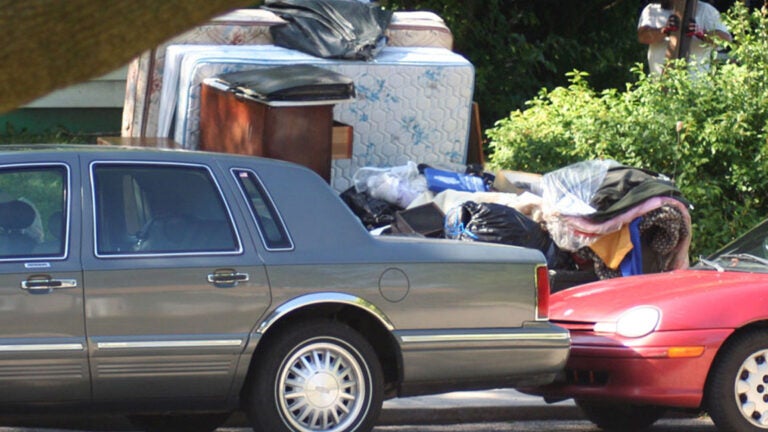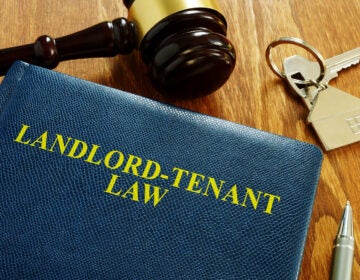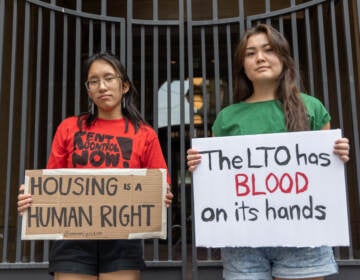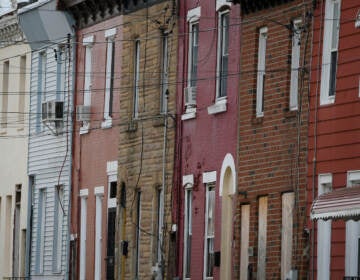Crunch time for bill to avert feared surge in N.J. evictions as landlords push back
The report predicts 300,000 New Jersey renters could be evicted for nonpayment in next four months.

(NJ Spotlight / Dennis Carr from Flickr)
This story originally appeared on NJ Spotlight.
New Jersey housing advocates are pressing state lawmakers for final approval this week of a bill that would extend protections against evictions of renters and homeowners who are unable to make payments because of the COVID-19 pandemic.
Amid some predictions of a surge in evictions as the $600-a-week extra federal jobless benefit comes to an end on July 31, and with the expiration last Friday of a national ban on evictions from federal properties, the bill would require mortgage lenders to offer forbearance agreements to borrowers in need for at least 90 days if their income and savings are below specified levels.
Courts would be allowed to order a mortgage lender to retract any negative credit-reporting filing for nonpayment of rent, and to fine landlords up to $5,000 per tenant for violations.
The bill would prevent landlords from evicting people for nonpayment of rent sooner than 60 days after the end of a public health emergency and would stop courts accepting complaints for nonpayment of rent. It would also forbid landlords from filing negative credit reports or imposing late fees on tenants who pay late or not at all.
If a tenant surrenders a property while the lease is still in effect, he or she would still be responsible for paying any arrears, and the landlord would retain the right to recover those payments, the bill says. But it gives tenants up to six months to repay for each month of arrears, or to spread repayments in equal installments over the term of the lease, up to 10% of household net income, whichever is lower.
The measures would codify and expand Gov. Phil Murphy’s Executive Order 106, issued in March, which bans evictions and foreclosures until 60 days after the end of the public health emergency. The order allows courts to accept filings for nonpayment of rent or mortgages but prevents enforcement of any eviction or foreclosure order.
Big pressure to get the bill through
The measures are needed because of the devastation caused by the virus to New Jersey’s economy and public health, the bill, now pending in the Assembly, says. An identical bill has already been approved by the full Senate.
The Assembly Appropriations Committee advanced the bill on Monday. Its sponsors later issued a statement saying the state needs to defend the interests of landlords as well as tenants. “People must stop looking at this housing crisis as landlords vs. tenants, as both are important to the housing ecosystem. If homeowners do not succeed, renters will be displaced; if renters do not succeed, homeowners will foreclose. It’s critically important for both to receive an equal opportunity to keep a roof over their heads,” they said.
Advocates are hoping the bill will get final legislative approval this week and be sent for the governor’s signature amid predictions that the state could face a flood of evictions and foreclosures whenever Murphy’s executive order expires.
“There’s a tremendous amount of pressure to get this done by the end of this month,” said David Smith, policy coordinator for Sen. Troy Singleton (D-Burlington), the bill’s lead sponsor in the Senate. “It’s something that really desperately needs to get done, and I think there is finally, hopefully the impetus for the legislature to finish it up and get it to the Governor.”
But the New Jersey Apartment Association, representing large professional landlords, opposes the bill, and predicted it will be amended before getting a final vote in the Legislature.
Nicholas Kikis, vice president of legislative and regulatory affairs for the trade group, said it understands the need to provide relief for tenants, and has urged its members to work with those whose income has been cut or eliminated in the pandemic . “Most have been doing just that,” he said.
Landlords criticize ‘one-size-fits-all’ approach
The bill’s flaws include a “one-size-fits-all” solution to repaying rent or mortgage arrears, and the fact that it applies to almost any tenant who is making less than $150,000 a year, as long as he or she has suffered a negative financial impact, Kikis said.
“We want to provide relief to those who actually need it, not to create an incentive for tenants to simply stop paying rent,” he said.
Under the bill’s plan to give a tenant six months to repay each month of rent arrears, that would mean apartment owners who received no rent from March to December of this year would have to wait up to five years to be fully repaid, Kikis argued. He predicted his members would be financially “devastated” if the latest version of the bill becomes law.
The impact of the crisis has been cushioned by the federal government’s $600 a week in extra jobless benefits, as well as state unemployment payments, he said, resulting in an overall reduction in rent payments to NJAA members of about 15% since the crisis began.
“We were bracing for much worse when this began, and I do think that the expansion of unemployment benefits and the one-time stimulus checks helped tremendously,” he said. Kikis said the group is eager to see what kind of substitute Congress agrees as the July 31 deadline approaches for the expiration of the $600 payments.
“If Congress ends without putting in an adequate substitute, I think we’re going to see conditions get significantly worse,” he said.
Forecast of how many renters unable to pay in August
Last week, a consultant’s report forecast that 40% of New Jersey renters, or about 450,000 households, would be unable to pay rent in August, and that there could be 304,000 evictions over the next four months — a 600% increase over pre-pandemic levels — unless protective measures are taken.
The report by Stout Risius Ross for a coalition of housing advocates, based its estimates on “Household Pulse,” a weekly national survey that has been conducted by the U.S. Census Bureau during the pandemic. The New Jersey projections are based on the number of people who told officials that they will be unable to pay next month’s rent, and whether they are already in arrears.
For those in arrears for a number of months, Stout estimated they would start to become subject to eviction orders after three months of nonpayment, and that delays to the eviction process could push that to four months — the period over which the 304,000 evictions are expected.
But the company’s managing director, Neil Steinkamp, acknowledged the evictions estimate is uncertain because of unknown variables like the number of tenants who reach agreement with their landlords to repay late rent, and to what extent unemployed people are borrowing from friends and relatives, or even using credit cards to pay rent.
“We’re starting to see more and more people use credit cards to make rent payments,” he said. “Historically, renters wouldn’t do that but in the current climate you’ve got such high unemployment and little access to capital.” Borrowing from friends and relatives is also harder now because those people, too, are more likely to be financially stretched, he said.
The report said communities of color are much worse affected than white communities. Forty-nine percent of African American renter households in New Jersey said they will be unable to pay their rent next month, contrasting with 18% of white renters.
Fair Share Housing Center, an advocacy group, said that unless more protection is given to tenants and homeowners who have been unable to pay rent, the state will end up spending more on social services like homeless shelters, Medicaid, and foster care.
“If New Jersey renter households face increased housing instability and eviction, they will rely more heavily on expensive social safety net programs, often paid for in part by state and local governments,” the group said in a statement.

Get daily updates from WHYY News!
WHYY is your source for fact-based, in-depth journalism and information. As a nonprofit organization, we rely on financial support from readers like you. Please give today.



![CoronavirusPandemic_1024x512[1]](https://whyy.org/wp-content/uploads/2020/03/CoronavirusPandemic_1024x5121-300x150.jpg)

